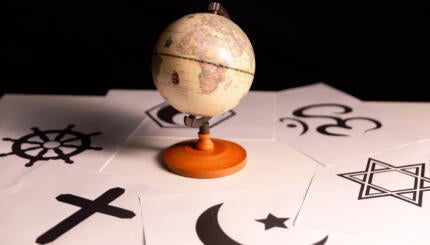With the flurry of discussion about how Jewish and interfaith families are handling the confluence of Hanukkah and Christmas this year, I’m here to say “chill out.” As a rabbi whose job is to engage with and support interfaith families, I’m well aware that this time of year may create angst for interfaith couples as well as their parents and relatives. I’m not dismissing or diminishing the very real emotions that are tied up with these holiday celebrations. What I do want to say is that we don’t need to feel concerned, anxious, or afraid.
READ: When Hanukkah and Christmas Coincide
Historically, some Jews have seen Christmas decorations in the home as a symbol of assimilation that should be combatted, or have felt their presence in public places as exclusionary or a symbol of pressure for them to adopt Christian beliefs. I, too, have had those feelings. Growing up in Kentucky, I very much felt self-conscious about being a minority and was wary about anyone forcing their religious beliefs on me. We may feel inundated with the commercialization of Christmas, but it is just that- commercialization. We are fortunate to still be living in a country where we have many freedoms. I’ve come to realize that any coercion I may have felt was my interpretation and was not the message that was intended. It took years before I let down my defenses and was able to appreciate the sheer joy of this season. People are generally friendlier, more polite, and in good spirits. The lights are beautiful. If a Jewish or interfaith family has a tree and it brings them joy, so be it. As was stated very well by my colleague in an earlier post, it doesn’t make them any less Jewish.
In fact, the origins of the Christmas tree are not Christian. They are pagan. Like other customs adopted by later religions, the tree was given added religious significance tied to the birth of Jesus. We do that, too. Jews have also modified practices that were once pagan to add Jewish significance. Today, we light the Hanukkah candles to remember the miracle of the oil and celebrate our religious freedom, but this ritual is likely an adaptation of the known custom to celebrate light at the time of the winter solstice.
The Christmas tree, while for some may have religious significance, is largely a symbol of spending time with family, joyous celebration, and love. I’ve learned not to judge a Jewish or interfaith family who chooses to welcome this symbol into their home. Beloved memories may be tied to that symbol, and I acknowledge the loss some may feel by not including the tree as part of their holiday celebrations at home. I’m not about to tell someone who feels deeply connected to the symbolism of the Christmas tree that they should refrain from this custom. We each find meaning in our own way and are free to express it as we see fit.
So, to tree or not to tree? That’s up to you. I’m just going to enjoy the delights of the season.
Rabbi Melinda Mersack is the Director of jHUB, which provides new ways for interfaith couples and families to comfortably explore Jewish culture in the modern world, a program of the Jewish Federation of Cleveland and the Jewish Education Center of Cleveland and an InterfaithFamily affiliate. Rabbi Mersack is proud to be a Rabbis Without Borders Fellow and a Brickner Fellow of the Religious Action Center of Reform Judaism. Rabbi Mersack attends summer camp as visiting faculty every year, and is an advocate for interreligious dialogue and social justice. She holds a B.A. from Washington University in St. Louis, and a Masters of Hebrew Letters and ordination from the Hebrew Union College – Jewish Institute of Religion.
Hanukkah
Pronounced: KHAH-nuh-kah, also ha-new-KAH, an eight-day festival commemorating the Maccabees' victory over the Greeks and subsequent rededication of the temple. Falls in the Hebrew month of Kislev, which usually corresponds with December.



